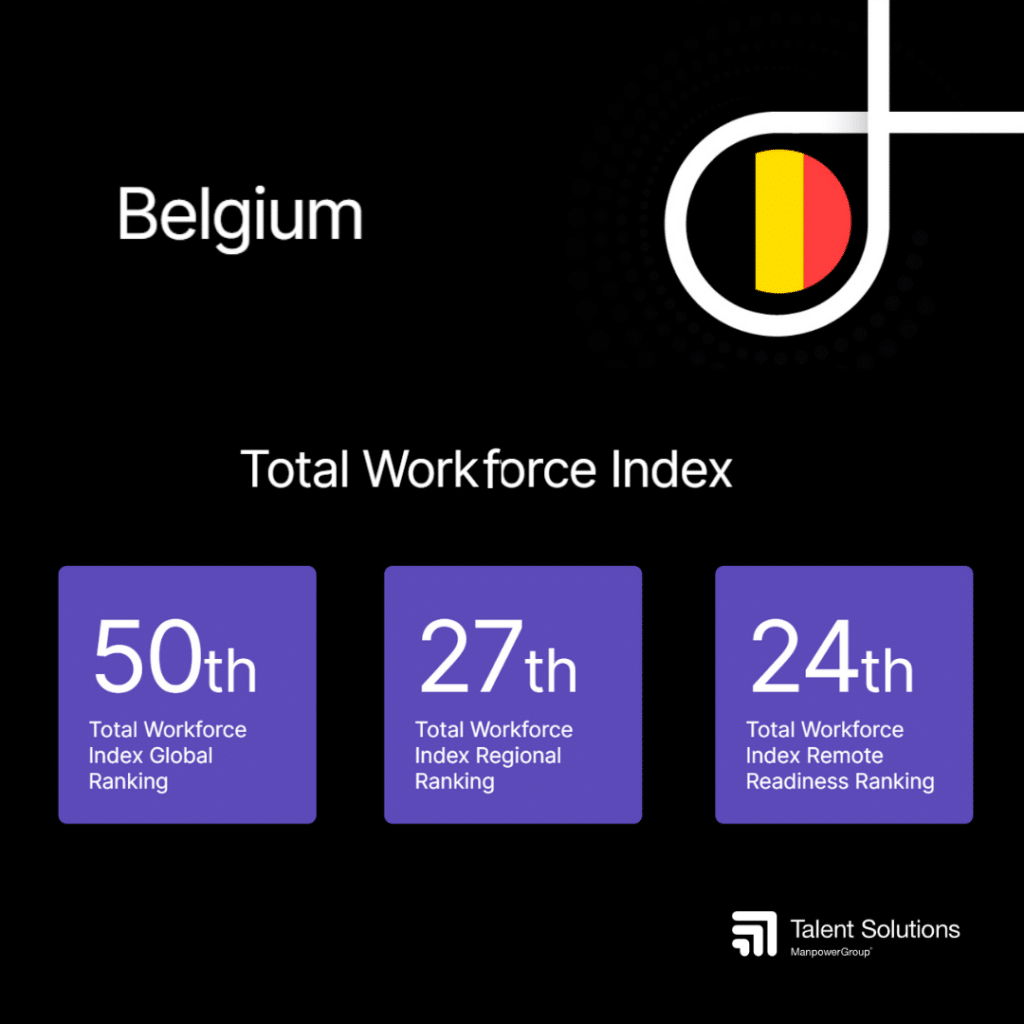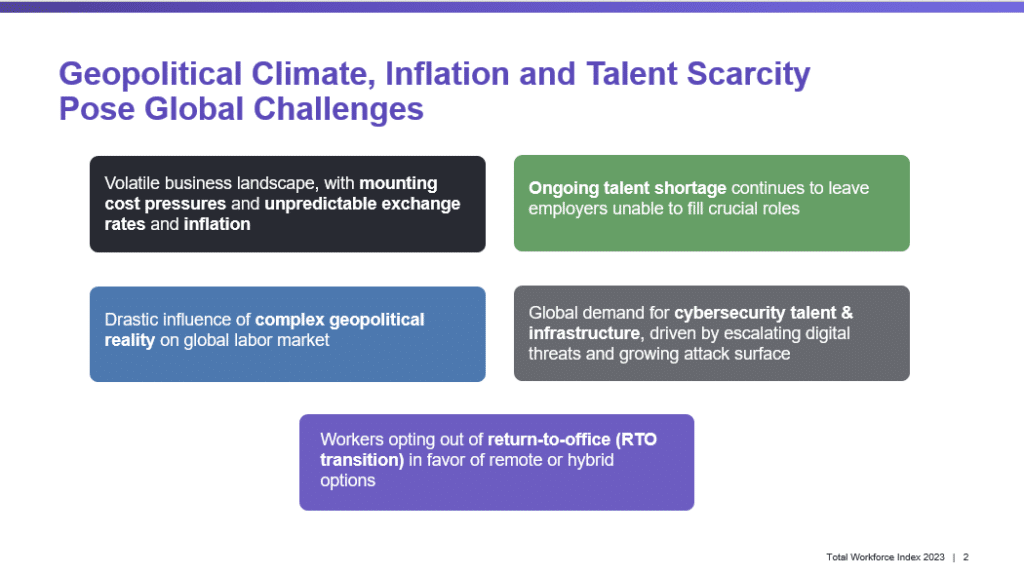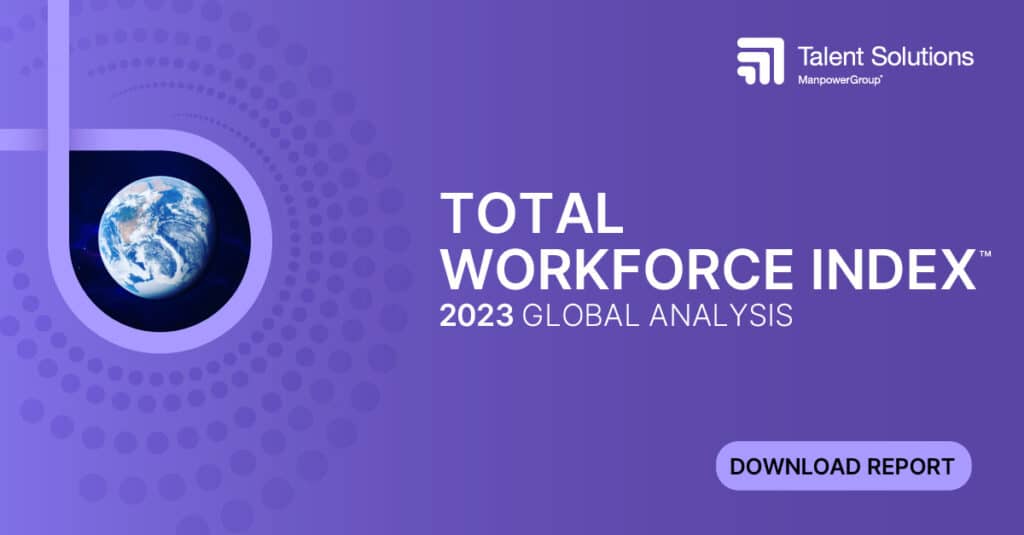Belgium moves up five places in ManpowerGroup’s 2023 Total Workforce Index™

Alexandra Lammens new Financial Director at ManpowerGroup BeLux
11 January 2024
Belgian employers plan to slow down hiring during the second quarter of 2024
12 March 2024Our country ranked 50th (out of 64 countries) at global level and 27th (out of 33 countries) at regional level (EMEA)
ManpowerGroup has published the tenth edition of its Total Workforce Index™ study. This Index measures and compares the relative ease of sourcing, hiring and retaining contingent and permanent workers in 64 labour markets around the world. ManpowerGroup experts analyzed 200 key factors related to 4 categories in each country: Workforce Availability, Cost Efficiency, Regulation, and Workforce Productivity. For 2023, Belgium is ranked 50th (out of 64) globally and 27th (out of 33) in the EMEA region. This represents a progression of 5 places globally and 1 place regionally.
At global level, the United States, Singapore and Canada top the ManpowerGroup ranking for 2023, while at European level, the top three are Ireland, the United Kingdom and Switzerland. Conversely, the bottom three worldwide are Nicaragua, Honduras and Bolivia, and at European level Turkey, Greece and Slovakia.
Compared with other European countries, Belgium’s 50th place in the world is well behind Ireland (6th), the United Kingdom (7th), Switzerland (10th), Estonia (13th), the Netherlands (14th), Norway (15th) and Italy (35th), and trails Poland (40th), Germany (42nd), France (43rd), the Grand Duchy of Luxembourg (46th) and Spain (47th). Only five European labour markets are less attractive than Belgium: Romania (54th), Serbia (55th), Turkey (56th), Greece (57th) and Slovakia (58th).
“Even though our country has made progress in our new global workforce ranking, we cannot be satisfied with the overall performance of our Belgian labour market,” says Sébastien Delfosse, Managing Director of ManpowerGroup BeLux. “As in previous editions, our report shows the extent to which labour costs remain a major handicap when Belgian and foreign investors assess the competitiveness of the Belgian labour market. Our country ranks 62nd out of 64 on this criterion. Even though our country performed well in terms of labour availability/quality and productivity, this was not enough to compensate for the lower scores recorded for labour costs and the regulatory framework, which remains more rigid than most of the other countries evaluated”.

Belgium’s strengths and weaknesses
With ageing populations, the availability of the working-age population is becoming increasingly important. For this reason, ManpowerGroup has increased the weighting of the Generation Z and Millennial populations to reflect this development in its analysis. This year, the study also measures the availability of highly qualified workers by correlating them with age.
Belgium stands out for its divergent scores on the 4 criteria studied: it occupies an excellent 16th place worldwide and 12th place within the region for the criterion of availability of talent. A good performance in terms of Productivity, ranking 28th worldwide and 14th in EMEA. However, Belgium continues to lag well behind in terms of its regulatory framework, which is considered too rigid (50th place worldwide and 30th in the EMEA region), as well as in terms of labour costs (62nd place worldwide and 31st in the EMEA region).
Also worthy of note is the 24th place for teleworking. This criterion assesses the various dimensions of teleworking, such as the number of people able to work remotely, access to technology and the performance of communication tools, control of cybersecurity risks, the performance of government online services, regulatory aspects and the human dimension (access to childcare services).
Among Belgium’s strengths, the ManpowerGroup report highlights the quality of our workforce (49.83% highly qualified and 60% fluent in English), tenth place on the gender equality criterion (out of 146 countries), and an impressive first place on the cybersecurity criterion.

Key challenges facing global labour markets
In its global report, ManpowerGroup identifies 5 major challenges facing labour markets worldwide:
- In a highly uncertain environment, workforce planning is more difficult than ever. Indeed, today’s business landscape is a volatile one. Mounting cost pressures, unpredictable exchange rates and inflation, continuous supply chain disruptions and fluctuating consumer demand, have made workforce planning more difficult than ever.
- Ongoing talent shortages – 74% in Belgium and 75% globally – continue to leave employers unable to fill crucial roles and risk undermining business development and growth.
- Major influence of complex geopolitical situation on global labor market. The multi-year impact of Russia’s war on Ukraine has drastically influenced the global economy and consequently the global labour market. The Hamas attack on Israel and the ensuing war could have similar consequences for the workforce, given the strategic importance of the region for international trade.
- The global demand for cybersecurity talent and infrastructure is growing, driven by the escalation of digital threats and the increase in the attack surface, i.e. all the places where a company is vulnerable to a cyber attack. Cybersecurity jobs are hard to fill, as are many other positions at all skill levels.
- Remote or hybrid forms of working continue to develop, while workers want more flexibility to choose where and when to work.
A strategic tool
The Total Workforce Index helps ManpowerGroup Talent Solutions experts to assist companies with their long-term workforce planning strategies, including talent strategy, location strategy, remote work allocation, capacity planning, cost savings, market investments, organizational restructure, workforce mix, and sourcing strategy.
*********
VISIT OUR TOTAL WORKFORCE INDEX™ WEBSITE
TOTAL WORKFORCE INDEX : GLOBAL REPORT
Market Profile Belgium
Total Workforce Index Glossary









